BMW 1 Series vs VW T-Roc - Differences and prices compared
Compare performance (300 HP vs 150 HP), boot space and price (28800 £ vs 26400 £ ) at a glance. Find out which car is the better choice for you – BMW 1 Series or VW T-Roc?
Costs and Efficiency:
Price and efficiency are often the first things buyers look at. Here it becomes clear which model has the long-term edge – whether at the pump, the plug, or in purchase price.
VW T-Roc has a slight advantage in terms of price – it starts at 26400 £ , while the BMW 1 Series costs 28800 £ . That’s a price difference of around 2362 £.
Fuel consumption also shows a difference: BMW 1 Series manages with 4.30 L and is therefore noticeable more efficient than the VW T-Roc with 5.50 L. The difference is about 1.20 L per 100 km.
Engine and Performance:
Power, torque and acceleration say a lot about how a car feels on the road. This is where you see which model delivers more driving dynamics.
When it comes to engine power, the BMW 1 Series has a convincingly edge – offering 300 HP compared to 150 HP. That’s roughly 150 HP more horsepower.
In acceleration from 0 to 100 km/h, the BMW 1 Series is convincingly quicker – completing the sprint in 4.90 s, while the VW T-Roc takes 8.90 s. That’s about 4 s faster.
In terms of top speed, the BMW 1 Series performs somewhat better – reaching 250 km/h, while the VW T-Roc tops out at 212 km/h. The difference is around 38 km/h.
There’s also a difference in torque: BMW 1 Series pulls evident stronger with 400 Nm compared to 250 Nm. That’s about 150 Nm difference.
Space and Everyday Use:
Cabin size, boot volume and payload all play a role in everyday practicality. Here, comfort and flexibility make the difference.
Both vehicles offer seating for 5 people.
Both models weigh roughly the same – around 1465 kg.
In terms of boot space, the VW T-Roc offers slightly more room – 475 L compared to 380 L. That’s a difference of about 95 L.
In maximum load capacity, the VW T-Roc performs slightly better – up to 1350 L, which is about 150 L more than the BMW 1 Series.
When it comes to payload, VW T-Roc minimal takes the win – 515 kg compared to 510 kg. That’s a difference of about 5 kg.
Who wins the race in the data check?
The BMW 1 Series holds a decisive overall lead in the objective data comparison.
This result only shows which model scores more points on paper – not which of the two cars feels right for you.
Costs and Consumption
View detailed analysis
Engine and Performance
View detailed analysis
Dimensions and Body
View detailed analysis
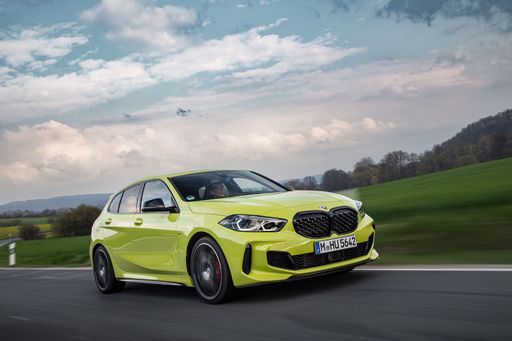
BMW 1 Series
BMW 1 Series
The BMW 1 Series is a compact premium hatchback that injects a proper sense of driving fun into everyday life, with sharp handling and a cabin that punches above its class. It’s a great pick for buyers who want sporty manners without losing practicality, and yes, you’ll still get that unmistakable BMW grin behind the wheel.
details
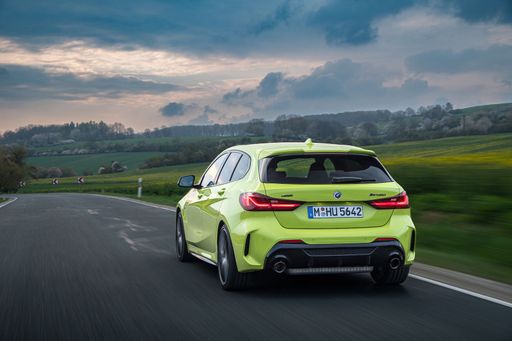
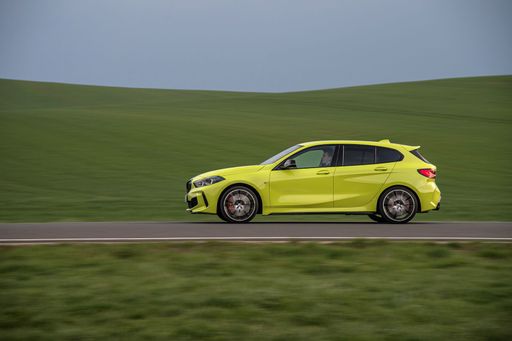
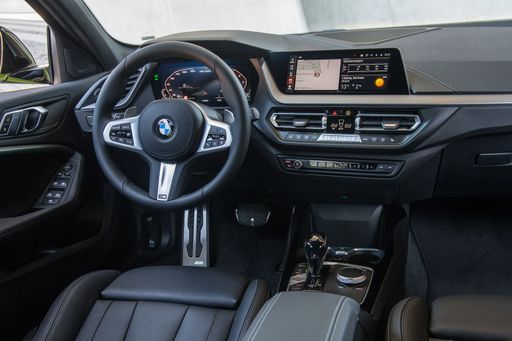
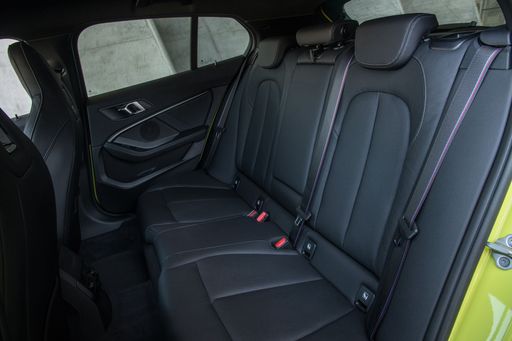
VW T-Roc
The VW T-Roc mixes cheeky, coupe-like styling with the everyday sense and space of an SUV, so it looks fun without sacrificing family sense. It’s a likeable all-rounder with tidy road manners and plenty of personality, ideal if you want a car that’s practical enough for chores but entertaining enough to enjoy.
details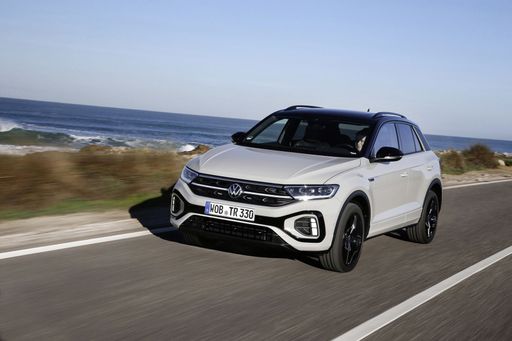
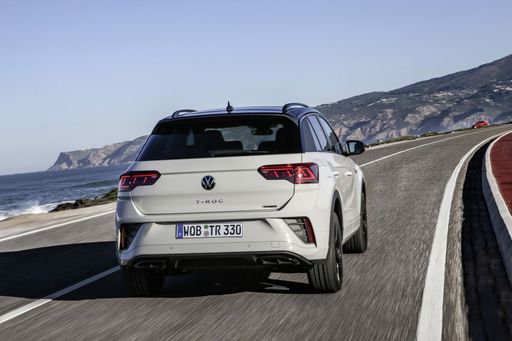
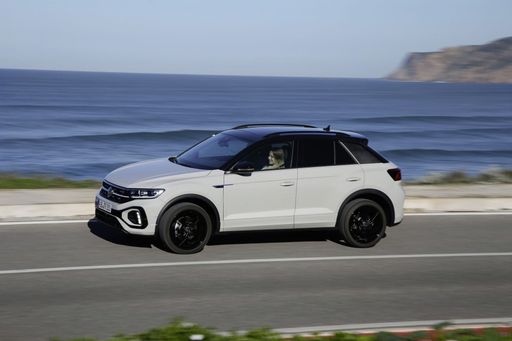
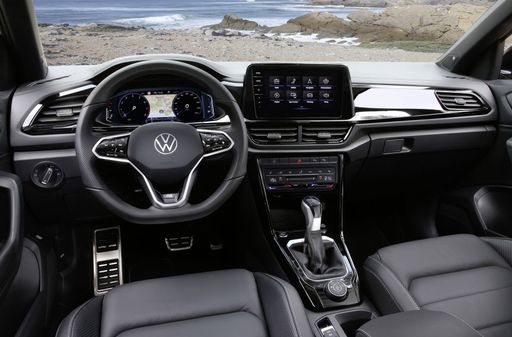
Costs and Consumption |
|
|---|---|
|
Price
28800 - 51100 £
|
Price
26400 - 38600 £
|
|
Consumption L/100km
4.3 - 7.6 L
|
Consumption L/100km
5.5 - 6.3 L
|
|
Consumption kWh/100km
-
|
Consumption kWh/100km
-
|
|
Electric Range
-
|
Electric Range
-
|
|
Battery Capacity
-
|
Battery Capacity
-
|
|
co2
112 - 173 g/km
|
co2
126 - 143 g/km
|
|
Fuel tank capacity
49 L
|
Fuel tank capacity
50 L
|
Dimensions and Body |
|
|---|---|
|
Body Type
Hatchback
|
Body Type
SUV
|
|
Seats
5
|
Seats
4 - 5
|
|
Doors
5
|
Doors
5
|
|
Curb weight
1465 - 1625 kg
|
Curb weight
1465 - 1539 kg
|
|
Trunk capacity
300 - 380 L
|
Trunk capacity
284 - 475 L
|
|
Length
4361 mm
|
Length
4373 mm
|
|
Width
1800 mm
|
Width
1811 - 1828 mm
|
|
Height
1459 mm
|
Height
1573 mm
|
|
Max trunk capacity
1135 - 1200 L
|
Max trunk capacity
1350 L
|
|
Payload
475 - 510 kg
|
Payload
368 - 515 kg
|
Engine and Performance |
|
|---|---|
|
Engine Type
Diesel, Petrol MHEV, Diesel MHEV, Petrol
|
Engine Type
Petrol, Petrol MHEV
|
|
Transmission
Automatic
|
Transmission
Manuel, Automatic
|
|
Transmission Detail
Dual-Clutch Automatic
|
Transmission Detail
Manual Gearbox, Dual-Clutch Automatic
|
|
Drive Type
Front-Wheel Drive, All-Wheel Drive
|
Drive Type
Front-Wheel Drive
|
|
Power HP
122 - 300 HP
|
Power HP
115 - 150 HP
|
|
Acceleration 0-100km/h
4.9 - 9.8 s
|
Acceleration 0-100km/h
8.9 - 12.3 s
|
|
Max Speed
210 - 250 km/h
|
Max Speed
196 - 212 km/h
|
|
Torque
230 - 400 Nm
|
Torque
200 - 250 Nm
|
|
Number of Cylinders
3 - 4
|
Number of Cylinders
3 - 4
|
|
Power kW
90 - 221 kW
|
Power kW
85 - 110 kW
|
|
Engine capacity
1499 - 1998 cm3
|
Engine capacity
999 - 1498 cm3
|
General |
|
|---|---|
|
Model Year
2024
|
Model Year
2024 - 2025
|
|
CO2 Efficiency Class
D, C, F
|
CO2 Efficiency Class
E, D
|
|
Brand
BMW
|
Brand
VW
|
What drive types are available for the BMW 1 Series?
The BMW 1 Series is offered with Front-Wheel Drive or All-Wheel Drive.




